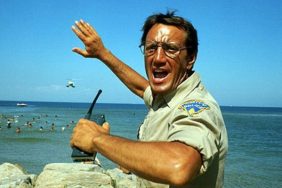30. White House Down (dir. Roland Emmerich, 2013)

Columbia Pictures
Propaganda fantasies don’t get more fantastic (in more ways than one) than White House Down, a glossy “Die Hard in the White House” action thriller a president almost exactly like Barack Obama in every possible way, who defends the White House from war-mongering Republicans and military contractors alongside a blue collar working stiff. Jamie Foxx plays the charming president, Channing Tatum plays the heroic everyman, and Joey King plays the pre-pubescent online journalist who blows the lid off the whole conspiracy and waves off an airstrike with the American flag. Whether you agree its politics or not, this is an entertaining explosion of liberal pride.
29. Z (dir. Costa-Gavras, 1969)

Cinema V
Z is about one particular right-wing-sponsored assassination and cover-up in Greece in 1963. It’s a fantastic thriller that still has one of the biggest cinematic gut punches of all-time. It shows the assassination, followed by the hard work of an investigator (Jean-Louis Trintignant), it shows the assassins being arrested, it gives the appearance of a thriller that bears good news, but it ends with a subscript of who is in charge at the time of release, and who’s name has been banned from ever uttering, and it’s utterly devastating. Despite profiling a coup that’s passed, Z still infuriates and stirs distrust in governments that continue to meddle abroad today.
28. Good Night, and Good Luck (dir. George Clooney, 2005)

Warner Independent Pictures
Good Night, and Good Luck was a passion project for George Clooney. As the son of a news anchorman, and someone who studied journalism in college, the tale of TV newsman Edward R. Murrow and his public row with Senator Joe McCarthy was a topic that was near and dear to him.
McCarthy was at the head of the contingent trying to root out the supposed “Red Menace” in the 1950s, when the scariest thing in the world was Communism. Murrow and his staff at CBS News ignored corporate pressure and government threats in order to deliver what Murrow thought was an important story. Ultimately, Murrow’s coverage of McCarthy’s witch hunt served a major blow against the House Committee on Un-American Activities, and turned public opinion against the senator.
27. Selma (dir. Ava DuVernay, 2014)

Paramount Pictures
Faced with the daunting task of taking the legend of Dr. Martin Luther King Jr and remembering his humanity, director Ava DuVernay chose to focus on one episode in the civil rights leader’s life. King’s battle for 1965’s Voting Rights Act and the mass march from Selma to Montgomery, Alabama, provides the historical context for an examination of his personal and family life, his clashes with President Lyndon Johnson, and his friction with other activists, and makes for a fresh take on the man everyone thinks they know. It’s a solid, moving, important example of what American movies can be when fresh voices are given a chance to take the reins.
26. Bob Roberts (dir. Tim Robbins, 1992)

Paramount Pictures
Tim Robbins cleverly reimagined the Bob Dylan documentary Don’t Look Back as a satirical celebration of a toxic right-winger who sings folk songs that are the diametric opposite of Dylan’s. (“This Land Is My Land, This Land Is My Land,” for instance.) There’s no trick so dirty, nor any manipulation of the public so shameless, that Bob won’t try as he ruthlessly pursues a Senate seat over his liberal rival (Gore Vidal as the brilliantly-named Brickley Paste).
25. The Great Dictator (dir. Charlie Chaplin, 1940)

United Artists
The presentation of an image was very important to Charlie Chaplin. His Tramp dresses like a gentleman and therefore he is a gentleman, despite the raggedness of the presentation. Post-World War I, however, the most famous human in the world (Chaplin) was usurped by a warmonger as the most famous monster (Hitler) in the world. And they had a similar trademark appearance.
In The Great Dictator, Chaplin used his image to deliver a message to the world: stand up to those who ask for their populace to die for his own prejudices. Absolute power was satirized in The Great Dictator, sure, but Chaplin ended the film with a direct speech to the audience, making sure that they were seeing his views that American intervention against Hitler was necessary.
24. The Day the Earth Stood Still (dir. Robert Wise, 1951)

20th Century Fox
In the 1940s and 1950s, America had a lot to fear; chief among those fears were the atomic age and the Cold War. Since the Hays Code still had influence over the industry, overt political commentary was tough to get into films. So many filmmakers hid their message in science fiction. The Day the Earth Stood Still is chief among them.
A humanoid alien comes to Earth with a gift for our president. The reactionary Army shoots him, fearing it is a weapon. After much xenophobia, the Army finally kills Klaatu, but not before he gives a message to a human sympathizer. The message, delivered by Klaatu’s robot companion, tells Earth that they can join the rest of the universe in peace, or be doomed to war and misery until the planet dies. Director Robert Wise may as well have said, “No good will come of this Cold War; let’s be friends.” Of course, that doesn’t make for nearly as good a movie.
23. Burn! (dir. Gillo Pontecorvo, 1969)

United Artists
Gillo Pontecorvo is best known for another political feature (see: #9), but his thought-provoking period drama is equally potent. Marlon Brando stars as a 19th century secret agent, sent to the Caribbean to stir up a slave revolt so rich white men can get richer off of the sugar trade. Years later, he’s sent back to fix what he broke, after the slave he turned into a leader starts getting big ideas of his own. Capitalism vs. idealism, broad concepts distilled into stirring human tragedy. Brando thought he did some of the best acting of his career in Burn! He was right.
22. Primary Colors (dir. Mike Nichol, 1998)

Universal Pictures
Primary Colors is a fictitious adaptation of a political novel. And yet, it bears a striking resemblance to the first Clinton campaign. John Travolta’s portrayal of governor Jack Stanton is clearly based on Bill Clinton; Emma Thompson, who plays Stanton’s wife, did not base her portrayal on Hillary, yet the comparisons remain. Billy Bob Thorton plays a political operative who is eerily similar to the “ragin’ Cajun,” James Carville. And then there are the scandals of womanizing and infidelity. Any way you slice it, it’s a fine cup of political satire.
21. Land and Freedom (dir. Ken Loach, 1995)

Gramercy Pictures
If you’re familiar with the films of social-realist British director Ken Loach, you won’t be surprised that his sympathies lie squarely with the peasants in this Spanish Civil War tale. An idealistic Communist travels from Liverpool to Spain in 1936 to fight the Fascists, but his dreams of revolution are battered by harsh realities of war and politics. Loach daringly stops the action for a lengthy sequence in which the newly liberated peasants have a community meeting about who gets to farm which land; it’s the kind of consensus-politics moment that few movies would spend so much time exploring.
Next: #20-11








